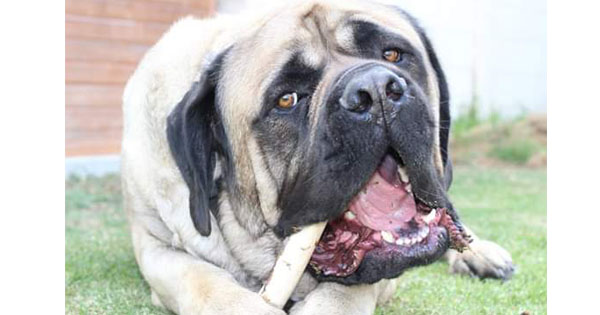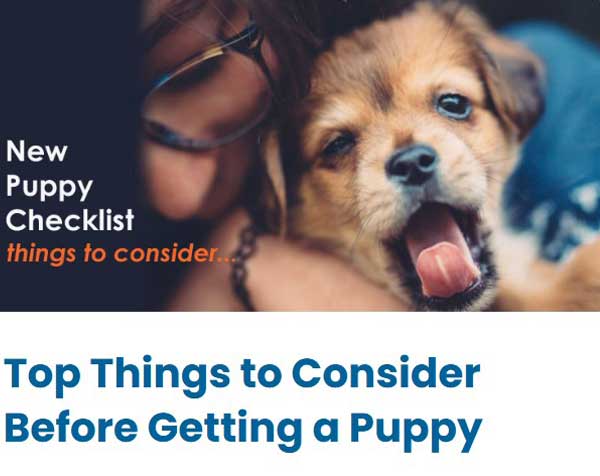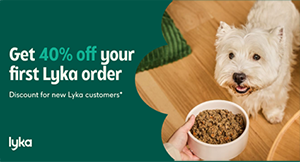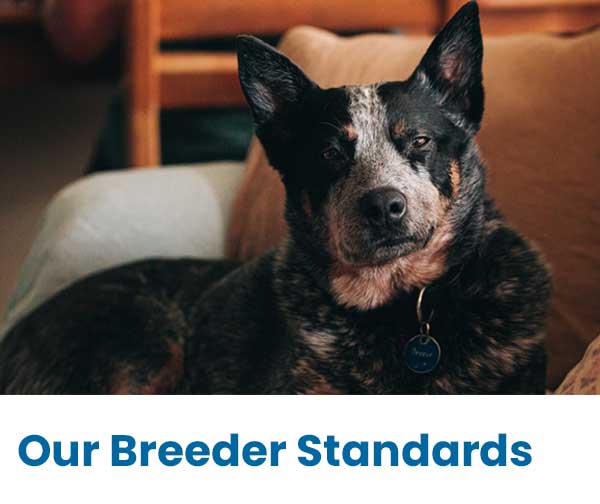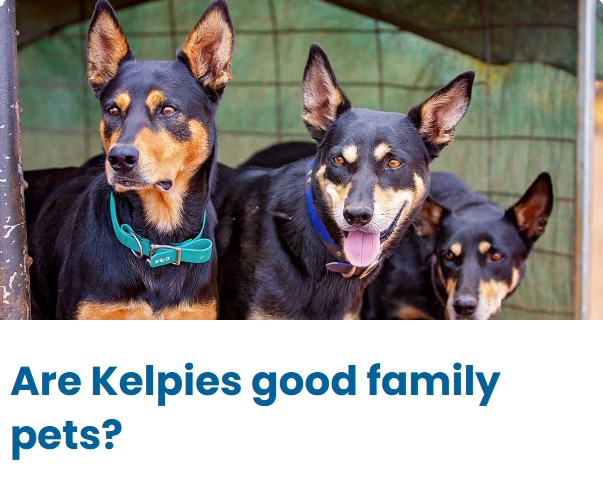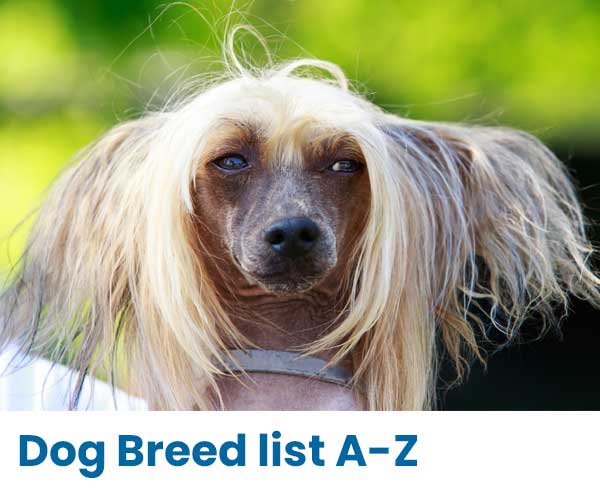Mastiff breed guide
The Mastiff is sometimes known as the Old English Mastiff. Mastiffs have been bred for all manner of tasks over the centuries. They were used as dogs of war, for gladiatorial contests in Roman arenas, for bear baiting and as draft animals. Their main use was as guardians of people and property. Today Mastiffs are bred almost exclusively as a superb companion animal and they are not generally regarded as a working breed. That said, there are Mastiffs today who compete in obedience trialling work, agility trialling, tracking trials and who work as therapy pets.
Mastiff temperament
Because Mastiffs grow into such large and powerful dogs, their temperament is extremely important. A dog the size of an adult Mastiff with an aggressive or nervous temperament could be extremely dangerous. A Mastiff should therefore be gentle, loving and loyal and their greatest pleasure should be to be with you.
While it is essential that a puppy come from a breeder who is aiming to breed a Mastiff with the correct temperament, the greatest influence is the treatment, training and experiences it receives throughout its life but especially as it matures to adulthood.
Mastiff personality
Every Mastiff has a different personality. Some are goofy and silly, some are dignified, some are a bit standoffish to strangers while others love everyone. Mastiffs can be quite aloof with strangers initially, but then will warm up to them quickly once introduced properly. One standout trait is that all of them are absolutely devoted to “their” humans.
Mastiffs are also quite sensitive to your moods. They are very keen to please their owners, and will be mortified if they have upset you in any way. If you are upset about something, they will be worried about you, and will notice your mood immediately. If you are happy and excited, they will be full of joy and playful. For this reason, it is important to not get angry with your Mastiff.
Mastiffs also LOVE to be with their families. They love to come inside and share your life. They do not enjoy being left alone, and will suffer if they do not have sufficient love and company. They generally love to go for a car ride – mainly because it means being with you.
Mastiff Training and Socialisation
Mastiffs do not respond to harsh training methods, and can become disinterested and complacent if you get annoyed with them. As with most breeds, positive training methods are always preferable and recommended. Experiment to find what really motivates your pup and use that to teach them new things. Most mastiffs love food, so they respond very well to training for food treats. Others, however, will respond better to a little game or a squeaky toy, or just to verbal praise.
Mastiffs are very sensitive and need to be very well socialised as pups. They NEED to experience different places, situations and people when they are young, and on an ongoing basis throughout their lives. This will ensure they develop, and remain, loving family companions.
How much space and exercise do Mastiffs need?
Mastiffs do not need a lot of exercise, in fact for young dogs it's best that they only have a small amount of exercise, and that they stop before tiring. This gives their growing joints and skeleton the best chance of developing properly. Being a heavy breed, a Mastiff's bones, muscles and ligaments are subjected to tremendous forces. It is therefore extremely important that you don't over exercise your Mastiff puppy and even your adult Mastiff. Once a Mastiff is fully grown, it is able to have more rigorous exercise, but even then, they are not the sort of dog that you will take jogging with you. They prefer their exercise to be a bit more fun, and in short bursts.
As to how much exercise is safe for a puppy, most experienced breeders and owners agree that your puppy will get sufficient exercise around your home and going on outings for socialisation. Certainly it would not need more than a gentle walk to supplement this and you should not be expecting your Mastiff puppy to accompany you jogging or going on long walks. Even on a gentle walk, always watch the puppy for signs that it is slowing down or tiring and don't keep pressing on further with a puppy that is tired.
It is a standard Mastiff owner's joke that that Mastiffs prefer to watch you exercise rather than to join in. While you shouldn't be concerned if your Mastiff isn't getting vigorous exercise, they do enjoy a daily walk or two, and it's important to bear in mind that while too excessive exercise can damage a Mastiff's health, so can being overweight.
You should also bear in mind that while Mastiffs make wonderful companions for children, because of their size, an able bodied adult will need to be responsible for exercising your Mastiff. A child and even a non-able bodied adult will have great difficulty controlling even a well trained Mastiff if it is being stubborn or playful. An adult will also need to be responsible for training.
Mastiffs - risks with jumping and stairs
Try and prevent your Mastiff puppy jumping. To avoid injuries, those experienced with Mastiffs will often train their dogs to wait and be lifted in to the car rather than allowing their Mastiffs to jump up. Many will also supervise their Mastiffs around stairs because of the potential for injury if a Mastiff slips or falls.
Mastiffs and heat
In general, Mastiffs do not cope well with hot weather. It is very important that they have a cool place to lie during hot weather and they will need even more fresh cool water than normal. Do not expect your Mastiff to be as active as usual during hot weather and avoid exercising your Mastiff during the hotter hours of the day. That is, unless swimming is an option - which is great for Mastiffs.
Mastiffs and grooming
In terms of grooming, Mastiffs are relatively easy. Their short coat needs only a quick brush a few times a week and possibly a wash every few months to keep it looking good. Like most dogs, Mastiffs moult. Some moult only a couple of times a year while others seem to moult continuously. If you happen to have a Mastiff who moults continuously, get used to the idea that you will always have Mastiff fur on your clothes, furniture and floors. An important aspect to grooming a Mastiff is to trim nails from time to time. You should start doing this from an early age so they get used to it. Care should be taken when trimming nails and your breeder should explain how to trim the nails.
General facts about Mastiffs
Life expectancy: Unfortunately, as with most of the giant breeds, Mastiffs are not particularly long lived. Their lifespan on average is between 8 to 10 years although there are a number of Mastiffs who live to be over 12 years and some who do not live toeven 8 years.
Size and Weight: In height, adult Mastiffs are usually 70 to 85 cm at the shoulder. This means that their head is at the height of an adults hip. In weight, an adult Mastiff will generally weigh between 60 and 100kgs, more than many owners. On average, males will be taller and heavier than females but there are plenty of exceptions. A Mastiff puppy looks cute and cuddly but as you will realise from these figures, it will grow into a large and powerful dog.
Information sourced from the Mastiff Club of Victoria, and thanks also to Andrew Munden - Cadfell Mastiffs for information, advice and photos.
Potential health issues in Mastiffs
As with any breed of dog, there are certain diseases and health problems to which the Mastiff is more prone than some other breeds. If you ensure you are dealing with a reputable breeder, who has done proper health checks, and you feed your pup on a good diet, raise him properly, don't let him get overweight, don't over exercise him, don't allow him to jump up or down from high places, then there is no reason you shouldn't have a healthy, happy dog for many years to come.
Because Mastiffs do have a number of hereditary problems that can develop, it's important you research and understand the checks and ongoing care needed. With a dog as big as a Mastiff, vet bills can be proportionately huge too - so make sure you know what you are getting into from the start!
Hereditary Diseases in Mastiffs
for diseases which are to some extent hereditary, there are tests which can be carried out on adult dogs which may help determine if puppies bred from those dogs are likely to be at risk from those diseases. The main types of hereditary or partly hereditary diseases to which Mastiffs are considered to be at risk and for which adult Mastiffs can be screened are hip and elbow dysplasia, eye disease and thyroid disease.
Hip Dysplasia can result in abnormal wearing of the hip joint causing lameness and pain in the rear legs. Generally symptoms will not appear until the puppy is 5 to 9 months old. X-rays are used to diagnose the disease and to try and screen for it in dogs to be used in breeding. While screening is not always a guarantee, it is recommended that puppies should only be purchased from breeders who have had their Mastiffs hip scored.
Elbow Dysplasia can have a number of possible causes, with all resulting in abnormal wearing of the elbow joint causing stiffness, limping and pain. X-rays are used to diagnose, and to try to screen dogs to be used for breeding. Most breeders will x-ray elbows along with hip scoring.
Be sure to ask the breeder for copies of the hip score and elbow x-ray report, and discuss it with the breeder and your vet.
Entropion and Ectropion can affect Mastiffs - the rolling in (entropion), or rolling out (ectropion) of the eyelid. Progressive retinal atrophy (PRA) is also a potential problem. Each of the three diseases can cause vision impairment and blindness. Screening for eye and thyroid diseases is often undertaken in the United States and some Mastiff breeders in Australia are now also starting to undertake such screening.
Mastiffs can suffer from bloat, which, if left unnoticed and untreated, can kill a dog within a very short time. Most deep chested breeds of dog are considered to be susceptible to bloat. Signs to watch for include swelling of the stomach, a hollow drum sound when the stomach is tapped, distressed pacing, restlessness and excessive panting. If you suspect bloat, take your dog to the vet immediately. Do not delay. To decrease the risk of bloat occurring, do not exercise your Mastiff for an hour before and after meals and feed an adult dog two smaller meals per day rather than one larger one. Be careful when selecting dry foods as some brands swell up more than others once they have been eaten. Some owners soak dry food so that it expands before the dog eats it.
Mastiff FAQ's
Are Mastiffs good guard dogs?
Mastiffs are not really a guard dog...Mastiffs are a companion breed. They can guard, but if it is a guard dog you are after there are better breeds for the purpose. Their smaller "brother" the Bullmastiff is a good example. Mastiffs will bark at intruders, and are protective of their family, but once introduced to a stranger, they should be okay with them. Many mastiff owners and breeders say that sometimes Mastiffs will just not take to a visitor, and recommend that you take notice. Mastiffs are very sensitive to body language and other signs that people give off, that we humans are not aware of.
Do Mastiffs slobber?
All Mastiffs slobber. The degree to which a Mastiff slobbers varies from dog to dog. Some dogs slobber only when they are eating, drinking or hot and there are others that hardly ever seem to stop. Most Mastiff owners never leave home without an old towel or something similar to use as a slobber cloth. If you have one that slobbers continuously, you will always need a towel handy to wipe down your furniture, your walls and even your guests. No one likes slobber but if you can't stand it, the Mastiff is not the dog for you.
Are Mastiffs good with children and other animals?
Mastiffs are wonderful with children but, as with all dogs, they must be properly introduced, preferably at a very early age and they must always be supervised. You can not expect any dog that has not had previous experience of children to be immediately reliable with a child. In fact, dogs who have not had much contact with children quite often don't see them as being from the same species as adults. Their body proportions and the sounds they make are quite different. By the same token, you can not expect a child who is not experienced with dogs, to be reliable with your Mastiff.
Because they are smaller, children are more vulnerable than adults and, being large dogs, there is a greater potential for a Mastiff to cause harm to a child, even if only accidentally. Even a wagging Mastiff tail is powerful and also about the right height to cause plenty of pain if it hits a toddler in the face.
Children are also less sensitive to potential danger and they do not always understand that their actions may be causing an animal distress. For example, because their co-ordination is still developing, a toddler which is trying to pat a dog may in fact, from the dog's point of view, be whacking it rather than gently stroking it. While a Mastiff's natural instinct is to move away from a tormentor, you should never allow a situation to arise where this instinct is put to the test. It is your responsibility to ensure that children treat your Mastiff properly and do not knowingly or otherwise hurt or distress it.
Other Animals
Being naturally loving and gentle dogs who love companionship, Mastiffs get on well with other animals. There are Mastiffs who live harmoniously with all manner of other animals including cats, ducks and horses. As with children however, the Mastiff and the other animal need to be properly introduced and supervised, preferably while the Mastiff is still a puppy.
If you are a small scale ANKC registered breeder and would like to be listed here, just contact us or follow a few simple steps to add your details yourself.
We welcome helpful comments and contributions to information about this breed by email
View Mastiff breeders

